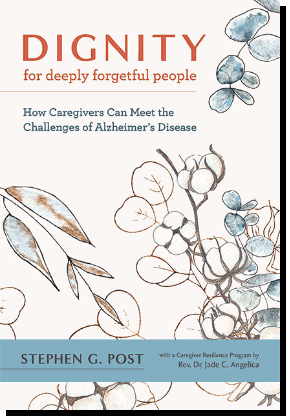
Newsletter August 17, 2021
Dignity for Deeply Forgetful People
Greetings, Friends.
You are invited to Duke University's Monthly Spirituality and Health Research Seminar, where I will be on Zoom presenting the topic of my new book, Dignity for Deeply Forgetful People: How Caregivers Can Meet the Challenges of Alzheimer's Disease with Johns Hopkins University Press, available May 2022.
Click to Join Zoom Meeting
Tuesday August 24, noon-1:00 US Eastern Time
Meeting ID: 972 4313 3810
Passcode: 485743
Summary: How do we approach a "deeply forgetful" loved one so as to notice and affirm their continuing self-identity? For three decades, I have worked around the world encouraging caregivers to become more aware of--and find renewed hope in--surprising expressions of selfhood despite the challenges of cognitive decline. I offer new perspectives on the worth and dignity of people with Alzheimer's and related disorders despite the negative influence of "hypercognitive" values that place an ethically unacceptable emphasis on human dignity as based on linear rationality and strength of memory. This bias, I argue, is responsible for the abusive exclusion of this population from our shared humanity. With vignettes and narratives, he argues for a deeper dignity grounded in consciousness, emotional presence, creativity, interdependence, music, and a self that is not "gone" but "differently abled." I will cover key practical topics in this talk such as: understanding the experience of dementia; noticing subtle expressions of continuing selfhood, including "paradoxical lucidity"; perspectives on ethical quandaries from diagnosis to terminal care and everything in between, as gleaned from the voices of caregivers; how to communicate optimally and use language effectively; the value of art, poetry, symbols, personalized music, and nature in revealing self-identity; and the value of trained "dementia companion" dogs.
About the Book
 |
For caregivers of deeply forgetful people: a book that combines new ethics guidelines with an innovative program on how to communicate and connect with people with Alzheimer's.
How do we approach a "deeply forgetful" loved one so as to notice and affirm their continuing self-identity? For three decades, Stephen G. Post has worked around the world encouraging caregivers to become more aware of--and find renewed hope in--surprising expressions of selfhood despite the challenges of cognitive decline.
In this book, Post offers new perspectives on the worth and dignity of people with Alzheimer's and related disorders despite the negative influence of "hypercognitive" values that place an ethically unacceptable emphasis on human dignity as based on linear rationality and strength of memory. This bias, Post argues, is responsible for the abusive exclusion of this population from our shared humanity. With vignettes and narratives, he argues for a deeper dignity grounded in consciousness, emotional presence, creativity, interdependence, music, and a self that is not "gone" but "differently abled." Post covers key practical topics such as:
- understanding the experience of dementia
- noticing subtle expressions of continuing selfhood, including "paradoxical lucidity"
- perspectives on ethical quandaries from diagnosis to terminal care and everything in between, as gleaned from the voices of caregivers
- how to communicate optimally and use language effectively
- the value of art, poetry, symbols, personalized music, and nature in revealing self-identity
- the value of trained "dementia companion" dogs
At a time when medical advances to cure these conditions are still out of reach and the most recent drugs have shown limited effectiveness, Post argues that focusing discussion and resources on the relational dignity of these individuals and the respite needs of their caregivers is vital. Grounding ethics on the equal worth of all conscious human beings, he provides a cautionary perspective on preemptive assisted suicide based on cases that he has witnessed. He affirms vulnerability and interdependence as the core of the human condition and celebrates caregivers as advocates seeking social and economic justice in an American system where they and their loved ones receive only leftover scraps. Racially inclusive and grounded in diversity, Dignity for Deeply Forgetful People also includes a workshop appendix focused on communication and connection, "A Caregiver Resilience Program," by Rev. Dr. Jade C. Angelica.
Cheers,
Stephen G. Post, PhD
[[tracking_beacon]]
Unsubscribe instantly from these emails by clicking here. Preferences.
Forward this email to a friend. Received this from a friend? Subscribe.
View this email on the web here.
© 2021 Stephen G. Post. All rights reserved.